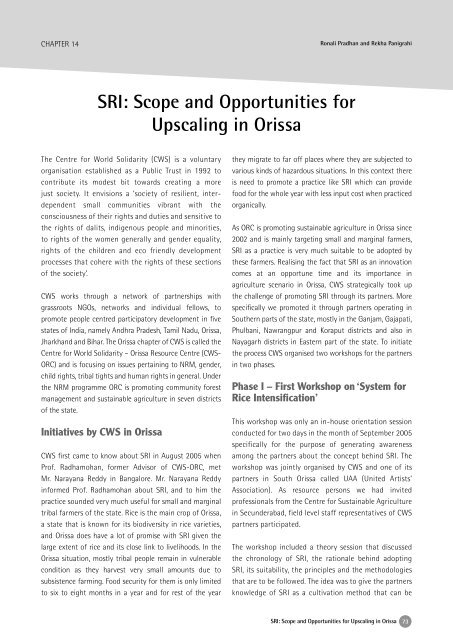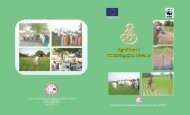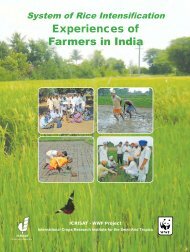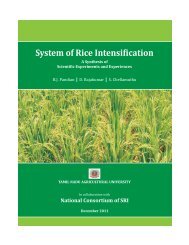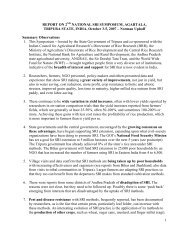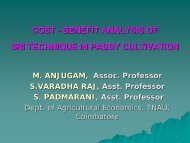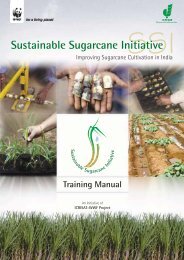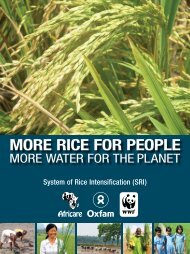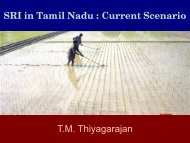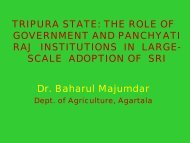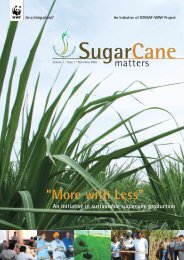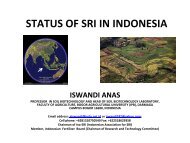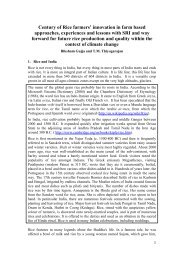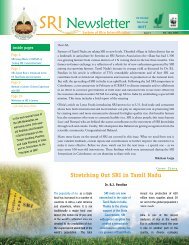SRI in Orissa - Cornell International Institute for Food, Agriculture ...
SRI in Orissa - Cornell International Institute for Food, Agriculture ...
SRI in Orissa - Cornell International Institute for Food, Agriculture ...
Create successful ePaper yourself
Turn your PDF publications into a flip-book with our unique Google optimized e-Paper software.
CHAPTER 14<br />
Ronali Pradhan and Rekha Panigrahi<br />
<strong>SRI</strong>: Scope and Opportunities <strong>for</strong><br />
Upscal<strong>in</strong>g <strong>in</strong> <strong>Orissa</strong><br />
The Centre <strong>for</strong> World Solidarity (CWS) is a voluntary<br />
organisation established as a Public Trust <strong>in</strong> 1992 to<br />
contribute its modest bit towards creat<strong>in</strong>g a more<br />
just society. It envisions a ‘society of resilient, <strong>in</strong>terdependent<br />
small communities vibrant with the<br />
consciousness of their rights and duties and sensitive to<br />
the rights of dalits, <strong>in</strong>digenous people and m<strong>in</strong>orities,<br />
to rights of the women generally and gender equality,<br />
rights of the children and eco friendly development<br />
processes that cohere with the rights of these sections<br />
of the society’.<br />
CWS works through a network of partnerships with<br />
grassroots NGOs, networks and <strong>in</strong>dividual fellows, to<br />
promote people centred participatory development <strong>in</strong> five<br />
states of India, namely Andhra Pradesh, Tamil Nadu, <strong>Orissa</strong>,<br />
Jharkhand and Bihar. The <strong>Orissa</strong> chapter of CWS is called the<br />
Centre <strong>for</strong> World Solidarity – <strong>Orissa</strong> Resource Centre (CWS-<br />
ORC) and is focus<strong>in</strong>g on issues perta<strong>in</strong><strong>in</strong>g to NRM, gender,<br />
child rights, tribal tights and human rights <strong>in</strong> general. Under<br />
the NRM programme ORC is promot<strong>in</strong>g community <strong>for</strong>est<br />
management and susta<strong>in</strong>able agriculture <strong>in</strong> seven districts<br />
of the state.<br />
Initiatives by CWS <strong>in</strong> <strong>Orissa</strong><br />
CWS first came to know about <strong>SRI</strong> <strong>in</strong> August 2005 when<br />
Prof. Radhamohan, <strong>for</strong>mer Advisor of CWS-ORC, met<br />
Mr. Narayana Reddy <strong>in</strong> Bangalore. Mr. Narayana Reddy<br />
<strong>in</strong><strong>for</strong>med Prof. Radhamohan about <strong>SRI</strong>, and to him the<br />
practice sounded very much useful <strong>for</strong> small and marg<strong>in</strong>al<br />
tribal farmers of the state. Rice is the ma<strong>in</strong> crop of <strong>Orissa</strong>,<br />
a state that is known <strong>for</strong> its biodiversity <strong>in</strong> rice varieties,<br />
and <strong>Orissa</strong> does have a lot of promise with <strong>SRI</strong> given the<br />
large extent of rice and its close l<strong>in</strong>k to livelihoods. In the<br />
<strong>Orissa</strong> situation, mostly tribal people rema<strong>in</strong> <strong>in</strong> vulnerable<br />
condition as they harvest very small amounts due to<br />
subsistence farm<strong>in</strong>g. <strong>Food</strong> security <strong>for</strong> them is only limited<br />
to six to eight months <strong>in</strong> a year and <strong>for</strong> rest of the year<br />
they migrate to far off places where they are subjected to<br />
various k<strong>in</strong>ds of hazardous situations. In this context there<br />
is need to promote a practice like <strong>SRI</strong> which can provide<br />
food <strong>for</strong> the whole year with less <strong>in</strong>put cost when practiced<br />
organically.<br />
As ORC is promot<strong>in</strong>g susta<strong>in</strong>able agriculture <strong>in</strong> <strong>Orissa</strong> s<strong>in</strong>ce<br />
2002 and is ma<strong>in</strong>ly target<strong>in</strong>g small and marg<strong>in</strong>al farmers,<br />
<strong>SRI</strong> as a practice is very much suitable to be adopted by<br />
these farmers. Realis<strong>in</strong>g the fact that <strong>SRI</strong> as an <strong>in</strong>novation<br />
comes at an opportune time and its importance <strong>in</strong><br />
agriculture scenario <strong>in</strong> <strong>Orissa</strong>, CWS strategically took up<br />
the challenge of promot<strong>in</strong>g <strong>SRI</strong> through its partners. More<br />
specifically we promoted it through partners operat<strong>in</strong>g <strong>in</strong><br />
Southern parts of the state, mostly <strong>in</strong> the Ganjam, Gajapati,<br />
Phulbani, Nawrangpur and Koraput districts and also <strong>in</strong><br />
Nayagarh districts <strong>in</strong> Eastern part of the state. To <strong>in</strong>itiate<br />
the process CWS organised two workshops <strong>for</strong> the partners<br />
<strong>in</strong> two phases.<br />
Phase I – First Workshop on ‘System <strong>for</strong><br />
Rice Intensification’<br />
This workshop was only an <strong>in</strong>-house orientation session<br />
conducted <strong>for</strong> two days <strong>in</strong> the month of September 2005<br />
specifically <strong>for</strong> the purpose of generat<strong>in</strong>g awareness<br />
among the partners about the concept beh<strong>in</strong>d <strong>SRI</strong>. The<br />
workshop was jo<strong>in</strong>tly organised by CWS and one of its<br />
partners <strong>in</strong> South <strong>Orissa</strong> called UAA (United Artists’<br />
Association). As resource persons we had <strong>in</strong>vited<br />
professionals from the Centre <strong>for</strong> Susta<strong>in</strong>able <strong>Agriculture</strong><br />
<strong>in</strong> Secunderabad, field level staff representatives of CWS<br />
partners participated.<br />
The workshop <strong>in</strong>cluded a theory session that discussed<br />
the chronology of <strong>SRI</strong>, the rationale beh<strong>in</strong>d adopt<strong>in</strong>g<br />
<strong>SRI</strong>, its suitability, the pr<strong>in</strong>ciples and the methodologies<br />
that are to be followed. The idea was to give the partners<br />
knowledge of <strong>SRI</strong> as a cultivation method that can be<br />
<strong>SRI</strong>: Scope and Opportunities <strong>for</strong> Upscal<strong>in</strong>g <strong>in</strong> <strong>Orissa</strong> 73


